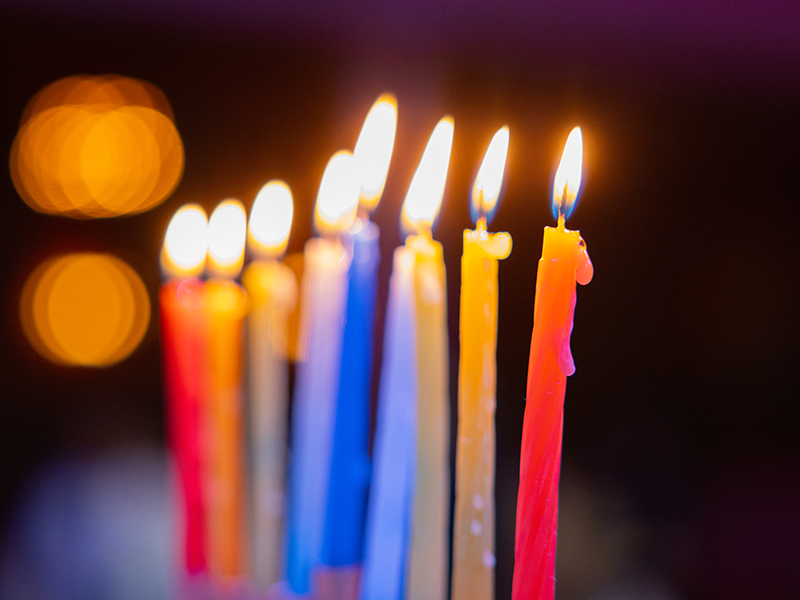Different circumstances demand different paradigms of thought and action, and the Jewish people have advanced through history by fulfilling the action demanded by the moment. Even God's promised blessings only are achieved through human agency. Our patriarchs and matriarchs showed a sophisticated variety of approaches to ensuring the transmission of the Jewish story. Taking any one episode from their narratives out of context robs us of the benefit of their worldly wisdom, creativity, and commitment.
Two episodes in Chayei Sarah illustrate this lesson. The first is Abraham's acquisition of the Cave of Machpelah as a burial site for Sarah. Upon Sarah's death, Abraham mourned and then set about to make arrangements for her to have a final resting place. He approached the Hittites, residents of the land, with humble nobility: "I am a foreigner living for a time among you; sell me a gravesite among you, that I may bury my dead here" (Genesis 23:4). Having already proved himself a powerful military leader, Abraham surely could have taken the land by force. After all, God already had promised that it would belong to him and his children. Instead, Abraham chose a path of respect and peace, insisting that he pay a fair market price. Ephron the Hittite negotiated with Abraham according to a pattern known from ancient Near Eastern sources.1 It was in Abraham's interest to purchase the land contractually in good faith; land given to him on a whim could just as easily be taken away, but a legal exchange endures.
Generations later, when Joshua led the Israelites into Eretz Yisrael after the Exodus, the circumstances called for military conquest of the inhabitants rather than a peaceful sale. This shift parallels twentieth-century Zionist history, when settlement of the land through purchase from Ottoman landlords gave way to the military necessity of defending the land against hostile Arab armies. There is a split today within Israeli and American Jewish politics over whether negotiation or military force is the way to ensure a secure Israel. We are arguing, in a way, over whether the times call for an Abraham or a Joshua.
* * *
Later in the same parashah, the matriarch Rebekah showed an uncharacteristic lack of agency that she doesn't repeat. After Abraham's servant went back east and retrieved her at the well as a wife for Isaac, she journeyed with him back to Canaan by camel. Isaac approached from the other direction, "And Rebekah looked up: seeing Isaac, she got off [vatipol mei-al] the camel" (Genesis 24:64). The word tipol means, "fell,"—literally, "she fell off the camel." The Plaut commentary compares this phrase to the English idiom "to fall all over oneself" and concludes: "We can say that one way or another, she [Rebekah] fell for him [Isaac]."2
The classical commentators, troubled perhaps by the unglamorous image of our foremother Rebekah falling off a camel, reinterpret this action as a sign of respect or modesty. Rashi, Sforno, and ibn Ezra suggest that Rebekah leaned or bowed low while remaining on the camel to show honor to Isaac. Rashbam says she bowed in modesty because she had been riding in the style of a man, and Radak argues that she bowed as women should when they encounter a man to whom they are not (yet) married.
In contrast to those commentaries, a student in my Torah study group offered an interpretation based on the simplest understanding that Rebekah fell off the camel when she saw Isaac. What we know about Isaac up to this point is that he was something of a hapless loser. He played no part in ousting the firstborn Ishmael, he unwittingly accompanied his father to his near sacrifice, and he waited passively while his father's servant retrieved a wife for him. The sight of this lackadaisical character floored Rebekah—literally. Distraught about being matched with him, she lost her wits and fell off her ride.
It's the last time Rebekah let her circumstances get the better of her. From this point on, Rebekah intervenes proactively in the unfolding narrative. Later in Genesis, we'll read how she encourages Jacob to buy Esau's birthright and steal his blessing. She helps her favorite son prepare the meal and don the costume that would deceive Isaac on his deathbed. She urges Jacob to leave when she hears of Esau's plot to kill him and convinces Isaac to send Jacob to her brother Laban's home to find a wife. Rebekah's choices and actions set the story in motion, leading to the fulfillment of God's promise to Jacob to bless him with land and abundant offspring.
* * *
These two moments in Chayei Sarah involving Abraham and Rebekah point to decisive characters who take active roles in developing the divine narrative of our people. In each case, God's promise of land and multitudes does not absolve the chosen individuals from responsibility for the fulfillment of that promise. On the contrary, those tapped by God for a special destiny must take control of their fate.
It's our task to act as agents of God's will, not as mindless automatons but through thoughtful, intentional deliberation. Choosing the best course of action rests upon the individual actors, according to the conditions we face. Sometimes, God describes the end but does not prescribe the means. In that sense, God's promise is not a passive guarantee but a call to take responsibility for enacting the vision that God has planted in our minds.
-
W. Gunther Plaut, gen. ed., The Torah: A Modern Commentary, Rev. Ed. (NY: URJ Press, 2005), p. 155
-
Ibid., Plaut, p. 161, n. 64
Rabbi David Segal is the spiritual leader of the Aspen Jewish Congregation in Aspen and the Roaring Fork Valley of Colorado. He was ordained at Hebrew Union College-Jewish Institute of Religion in New York and is an alumnus of the Wexner Graduate Fellowship.
As Rabbi Segal points out, Parashat Chayei Sarah tells us two stories, both of which are presented in intricate detail. The first episode focuses on Abraham's purchase of a burial site for his beloved Sarah. The second recounts the mission to find a wife for Isaac, Abraham's precious son. The reader is left to wonder why these two stories are told together. We are reminded yet again that the Torah narrative is not history as we understand that word. Rather, the Torah tells us what happened so as to teach us about what we need to know in our own time.
If one reads back in Torah, we find that God makes two promises to Abraham—promises that are each repeated five times. The first promise is land—Canaan—that will one day be his (Genesis 12:7; 13:14-17: 15:7; 15:18-21; 17:8) And, the second promise is children (Genesis 12:2; 13:16; 15:5; 17:4-5; 22:17).
Yet, what is the reality at the time of Sarah's death? Abraham owns no land and he has only one son (Ishmael, his first son, was banished and would not participate in the covenant). It would appear that the promises made to Abraham would not be fulfilled.
With this as background, we can understand the significance of the two central stories found in Chayei Sarah. Abraham enters into a lengthy, very embarrassing, almost desperate negotiation with the Hittites to buy a field with a cave to bury Sarah. In the end, a plot of land with a burial cave is purchased. However, this is as much of the divine promise that Abraham will ever see.
In the second episode of this portion, Abraham sends his servant Eliezer back to Ur, the ancestral home, to find a wife for Isaac who, according to Rashi, is 37 years old at the time of Sarah's death (Rashi on Genesis 25:20). Abraham has a child but no grandchild—no posterity. As with the acquisition of land, acquiring a wife for his son will require much negotiation and much money. Here two, after much negotiation Eliezer is able to "acquire" a wife for Isaac, but Abraham is not to see fulfillment of the grand promise of many offspring.
So, what is the parashah teaching us? The covenant with Abraham—indeed with the Jewish people—is not that God will act to bring it about. Rather, God lays out the promise, but Abraham and his children must do the hard work to bring about the desired outcome. The covenant will be what God said it would be, but not without human action. The meaning of these events is that God depended on Abraham in his generation and depends upon us in ours.
We know from Jewish history that if we want a land of our own and generations of Jewish children we cannot leave the future to God. We are challenged by God to fulfill the covenant and our future will depend on our meeting that challenge.
Rabbi Robert Orkand is now retired, having served as a pulpit rabbi for 41 years, the last 31 of which was as Senior Rabbi of Temple Israel in Westport, Connecticut. He now lives in Natick, Massachusetts, with his wife Joyce and very close to their two granddaughters (and their parents!).
Chayei Sarah, Genesis 23:1–25:18
The Torah: A Modern Commentary, pp. 156–167; Revised Edition, pp. 153–167;
The Torah: A Women's Commentary, pp. 111–132
Explore Jewish Life and Get Inspired
Subscribe for Emails



